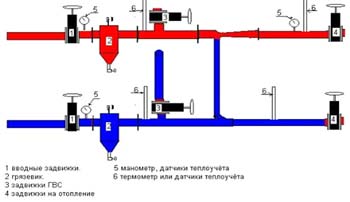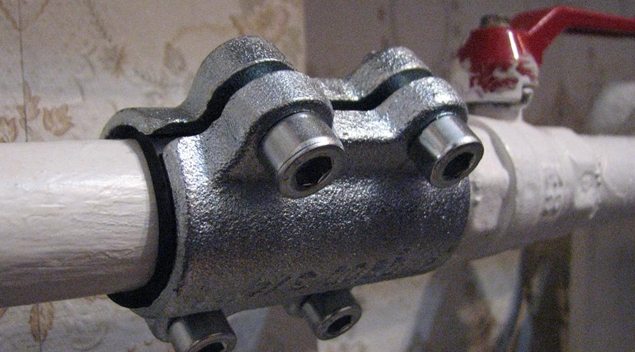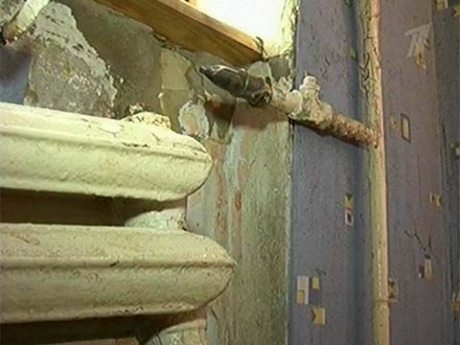Who is guilty?
Once the consequences of the accident have been eliminated, the victim needs to address the issue of obtaining compensation.
To do this you need:
- Determine the culprit of the incident.
- Conduct a damage assessment.
- Submit a written complaint.
- Go to court to recover compensation (if the culprit did not pay compensation voluntarily).
So, first of all, you need to identify the culprit. Even if the accident occurred in the apartment of the neighbor above, this does not mean that the owner of the apartment is to blame. Depending on the situation, responsibility may be assigned to the management company, the apartment owner, or the tenants.
Let's take a closer look.
If the battery ruptures
In accordance with Art. 30 of the Housing Code of the Russian Federation, the owner is responsible for the serviceability of engineering structures in the apartment. If an incident in an apartment occurred due to the actions or inaction of the owner, then he is obliged to compensate the victims for damage (Article 1064 of the Civil Code of the Russian Federation).
The battery (heating radiator) in the apartment is the property of the owner. Therefore, responsibility for its serviceability rests with the owner.
Therefore, if the cause of the accident was a battery failure, then you must file a claim with the owner.
Having paid the debt, the apartment owner has the right of recourse:
- to a repair organization (if the cause of the accident was repair work carried out by a specialized company under a contract);
- to the developer (if less than 3 years have passed since the delivery of the house);
- to tenants (if an agreement on full liability in the event of an accident was concluded between the owner and tenants).
So, when the battery breaks, the victim files a claim against the owner of the apartment. And the owner subsequently recovers damages from the guilty parties or bears the loss himself (if the worn-out radiator is not replaced in a timely manner).
If the riser bursts
The riser is part of the utilities that belong to the common property of the house. The management company is responsible for their safety.
However, each situation must be considered individually:
- if the accident occurred due to wear and tear of the riser, then the management company must pay for the damage;
- if the breakthrough occurred due to the actions of the apartment owner, then he is considered to be the culprit of the incident.
Example. Ilya carried out repairs. The riser was located next to the window. When installing the ceiling curtain, Ilya accidentally drilled the riser. The water flooded the neighbors. In this case, Ilya will be at fault and the neighbors can recover damages from him.
So, if the riser burst due to high pressure, old age or the actions of the management company’s employees, then the organization will pay. And if the owner of the apartment damaged the riser during repairs or accidentally, then the damage will need to be recovered from him.
Snezhana Pogontseva
Lawyer, author-editor of the website (Family law, 12 years of experience)
If a pipe bursts
And in case of an accident with a pipe, there is also no single culprit. The law provides for the following procedure for dividing responsibility:
- if the pipe is located outside the apartment or to the tap installed in the apartment, then responsibility rests with the management company;
- if the accident occurred due to unexpectedly high pressure exceeding established standards (water hammer), the management company is also to blame;
- the owner compensates for damage if the cause of the incident was wear and tear of pipes in the apartment or poor-quality replacement of pipes.
A pipe burst in the apartment and flooded the neighbors, who is to blame and what to do
Situations where a pipe burst and flooded neighbors happen infrequently, but are always controversial. After all, the question arises who is to blame and who will be responsible for repairing the heating and restoring the normal condition of the neighbors’ apartment. Let's look at this topic in more detail below.
What to do if a hot water pipe bursts
First of all, you need to be careful not to get burned, because the water can be very hot.
Proceed as follows:
- Shut off the riser in your apartment to prevent new water from entering.
- Be sure to turn off the electric meter, as water is highly conductive.
- If the temperature allows, then start collecting water with a rag. This way, neighbors on the lower floor will suffer less.
- Place any container under the damaged pipe - a bucket, basin. Better let the water flow there.
- Call a plumber. If this happens at night, call the emergency service of the city water utility.
By the way, if a plumber changes a part of a pipe, faucet or any other element that has become unusable, then save it. This can help in identifying the causes of the breakthrough.
A heating or water pipe has broken
Make something like a clamp from scrap materials. Take rubber, thick fabric, wire. Wrap the break area and secure with wire using pliers. You can try to cover it with cold welding.
But even if the leak is eliminated, remember that it can recur at any time. And a major overhaul is needed. Just don’t do it yourself, without notifying the service company.
After eliminating the hole, we advise you to take a photograph of the “accident site” and record each drip. This will help you prove your losses. Of course, if the cause of the accident is not your own.
But really, who can be to blame for pipe bursts?
Let's look at the nuances:
- If the leak occurred before the first tap from the riser, then the management company must be responsible. The owner of the apartment is responsible for all other pipes, as well as sewerage.
- The risers and heating radiators are also managed by the management company.
- If the owner repaired them or installed new radiators and did not notify the housing office, then he himself is to blame.
After eliminating the leak, you need to draw up a flood report. This should be done by representatives of the management company. It does not matter whether the plumbing accident occurred in the bathroom, room or kitchen.
The document is drawn up in two copies and must contain the following information:
- address where the accident occurred, date of the incident;
- a description of what happened to the application list of damages;
- probable causes of the breakthrough;
- data of the persons who drew up the act.
Read the document carefully before signing it. Make sure that everything is reflected correctly and completely.
The heated towel rail burst and flooded the neighbors - what to do
The heated towel rail is a common property (see Decree of the Government of the Russian Federation dated August 13, 2006 N 491 with the latest amendments). But different people or organizations may be responsible for its failure:
- If the coil is new, and water flows from it itself, then the fault falls on the manufacturer.
- When the house itself is a new building, the developer will be responsible for the impulse.
- If the coil was old and leaked regularly, then the apartment owner is to blame. After all, he must monitor the safety of not only the pipes, but also the entire room (apartment).
- If the heated towel rail was repaired on time, then the management company is responsible.
However, the guilt of the management company or developer must still be proven. Therefore, get ready for numerous examinations, showdowns, and if the damage is significant, then to court.
Where to contact?
In order to recover compensation for damage, it is necessary to officially identify the culprit. Moreover, the internal conviction of the victim is not enough for this. An engineer from the management company can identify the culprit when inspecting the scene of the incident when drawing up a flood report. If at first glance it is impossible to determine the cause, then you need to order a construction and technical examination.
The procedure is necessary to find out the causes of the incident and identify the culprit. Main causes of accidents:
- use of low-quality materials during repairs;
- unlawful interference with the water supply system;
- water hammer;
- poor quality repairs.
A specialist will visit the apartment, conduct an inspection and issue an expert opinion. For a document to be valid in court, you need to check whether the specialist has a license. If there is no license, there is no need to enter into an agreement with the company, since the court will not accept the conclusion as evidence.
Who should pay if the tenants flood the neighbors?
Where should I go if my neighbors’ children are constantly crying, making noise, or running around?
The heating riser burst: who is to blame?
According to the “Rules for the maintenance of common property”, approved by Decree of the Government of the Russian Federation dated August 13, 2006 No. 491, responsibility for the repair and safe operation of intra-building elements of heating systems (common property) of apartment buildings is assigned to management organizations.
In the event of an accident in an apartment, it is more difficult to determine the culprit. Article 1064 of the Civil Code of the Russian Federation provides for full compensation for damage to victims. Sometimes citizens responsible for the flooding admit guilt and do not refuse financial compensation. If this does not happen, victims can forgive irresponsible neighbors or seek coverage of losses incurred through the court.
The management company is responsible for summer breakouts of risers inside residential premises. If the fact of illegal replacement of equipment is established, then compensation for damage in an emergency situation will fall on the shoulders of the apartment owner.
In case of indoor accidents during the heating season, the guilty party is determined taking into account the following circumstances:
- Where is the location of the breakthrough (before or after the cut-off device),
Important! If the pipe to the shut-off valve bursts, then the fault lies with the UO. Otherwise, the owner pays for the repair of damaged property. - Have any elements of the heating system been replaced?
- If so, was permission from the Criminal Code obtained? (If not, then the responsibility of the management company is removed.)
- Were inspections of the converted part carried out by representatives of the management company? Does the owner have a certificate of readiness of this equipment for the season?
Residents are required to promptly report the need to replace pipes, radiators and other components to the management company. Article 210 of the Civil Code of the Russian Federation makes the home owner fully responsible for the maintenance of his property.
To save heat and reduce utility bills, you can always install heat meters for heating. Find instructions for installing them in this article.
Dear readers! If you have any questions on the topic “How to transfer residential premises into non-residential premises - procedure and documents for transfer>” or have other questions, ask them right now - contact the online consultant form or call us at 8 (800)-350- 30-02 (call and consultation are free for all regions of Russia)!
Many communications used in apartments are short-lived. Moreover, they can cause flooding for your neighbors if your pipe bursts.
Before looking for those to blame for this situation, you need to try to understand the causes of the incident.
Factors leading to a pipe break can vary.
The most common of them:
- Faulty condition of heating devices, fittings, dilapidation of the pipes themselves. All this causes a violation of the tightness of the system.
- Water hammer caused by high pressure.
How to recover damages?
The procedure for collecting compensation varies depending on the culprit of the incident. Let's consider different situations.
If the management company is at fault
The owners of all affected apartments collectively or each of them individually can file a claim with the management company.
In this case, collection occurs on the basis of the Consumer Protection Law. This means that if the management company refuses to satisfy the claim, the victims may additionally recover:
- penalty in the amount of 3% of the cost of damage;
- a fine for refusal to fulfill a claim in the amount of 50% of the claim price.
If the apartment is municipal
If the apartment is municipal, then the claim for damages is sent to the district administration. If tenants live in the apartment under a social tenancy agreement or the premises are provided for the residence of a specialist as a service, then the tenant may be held jointly and severally liable.
If in court the district administration proves that the apartment was provided to the tenant with proper communications, and the incident was caused by his actions, then damages will be recovered from the tenant. He is also responsible in a situation where the accident was caused by his inaction. For example, he knew about a problem with the battery or riser, but did not report it to the district administration.
Example. Ivan received a municipal apartment as a service apartment. In the spring, the heating radiator began to drip. A minor leak arose and flooded the neighbors below. Ivan suggested whitewashing the spot, the neighbors agreed. A few days later the heating was turned off and the water was drained. Ivan did not report the incident to the district administration and did not take any measures himself. In the fall, they gave pressure to the pipes when Ivan was at work. The apartment below was heavily flooded. They went to court to recover damages. During the process, the neighbors explained that Ivan knew about the problems with the battery. Therefore, damages were recovered from him.
If the apartment is owned by a citizen
The owner is fully liable for damage caused through his fault. He is obliged to keep the heating and plumbing equipment of the apartment in full working order. And it doesn’t matter whether he lives in an apartment or not.
To establish the exact details of the owner of the apartment, you can order an extract from the Unified State Register of Real Estate. The document can be obtained online on the Rosreestr website or ordered through the MFC. The extract contains information about all current owners of the premises. If the apartment is in shared ownership, then the demands must be addressed to all owners jointly (depending on their share in ownership).
If the cause of the accident was the actions of the repair crew, then this does not relieve the owner of the apartment from liability (determination of the Investigative Committee for civil cases of the Supreme Court of the Russian Federation dated September 5, 2017). He is obliged to compensate the victims. But after this, he can go to court to recover the amount paid by way of recourse from the repair team.
Of course, recovery by way of recourse is only possible in a situation where the repair work was carried out on the basis of a contract.
If there are tenants
Even if there are tenants living in the apartment, the victim must address his claims to the owner. Since, if the apartment owner and the tenant do not have an agreement, then it will be difficult to legally hold him accountable.
If the agreement is concluded, then the owner of the apartment will be able to recover from the tenants the costs incurred to pay for the damage to the victims and the damage caused to his apartment.
Are you tired of reading? We’ll tell you over the phone and answer your questions.
Finding out the causes of the accident
Most of the high-rise buildings were built during Soviet times. In those years, internal pipelines were steel or cast iron. Despite the strength of these materials, corrosion processes eventually lead to wear of the pipes, which requires their replacement. Many residents, trying to prevent an emergency, independently reinstall the elements of the system. However, this is the wrong step.
Who is responsible for the pipes in the apartment? The answer to this question is found in Art. 161 of the Housing Code, as well as in government decree No. 354 dated May 6, 2011. These acts note that the responsibility to monitor the condition of pipelines in multi-storey buildings is assigned to the management company. The same organization must carry out repair work.
Therefore, it is important to determine the cause of the plumbing accident. First of all, when a riser in an apartment bursts, you should find out who is to blame. This determines who will have the responsibility to compensate for the damage caused.
Lawyer's answers to private questions
Owner of an apartment in a new building. The house was commissioned a year ago, I haven’t done any renovations yet. Water was leaking from the heating pipes and angering the neighbors. Who should pay?
Heating distribution is the responsibility of the management company. In accordance with the law, if your apartment was also damaged, you can present your claims to them.
The cold water supply shut-off valve was broken. My apartment and the neighbors below flooded a little. The management company sent specialists, they turned off the water and replaced the tap. Neighbors are collecting documents. To sue me. But I also suffered in this situation. Why should I pay them?
You need to collect documents about the fault of the management company, since the shut-off valve for cold water supply is a common property of the house, and the management company is responsible for it. If your neighbors file a lawsuit against you, you will be able to prove your innocence.
Who orders a construction and technical examination – the victim or the culprit?
Doesn't matter. The examination can be ordered by either party or each party independently.
Heating system failures during the heating season
So, what malfunctions of the heating system can cause an accident.
In fact, there are not so many of them, and from a legal point of view they are divided into:
- in-house;
- intra-apartment.
Depressurization of threaded connections
This division allows us to specify the search for the guilty party. After all, by law, responsibility for the heating system of each home is assigned personally to consumers of services and the companies providing them.
For reference: the entire home heating system, including pipes and heating devices (radiators) in residents’ apartments, is common property.
And the management organization is responsible for its technical condition and maintenance, provided that the residents have not made replacements or repairs in their apartments.
Then the residents themselves are responsible for all alterations in the apartment.
The in-house heating system consists of:

Thermal unit diagram
supply and return pipelines;
- inlet valves in the heating station (in the basement of the house);
- shut-off valves;
- filters for hard and soft purification of coolant;
- pressure gauges;
- thermal energy metering devices;
- circulation pump;
- boiler for heating hot water (not everywhere).
The management company is entirely responsible for the in-house heating system, and in the event of an accident on these elements, the blame for the consequences falls entirely on their shoulders and “wallet”.
And if a breakthrough occurs and water begins to flood the entrance or basement, then in such a situation there is only one way out - to call the city emergency service.

Emergency service
Specialists will arrive and shut off the supply of coolant to the in-house heating system, and your call will be recorded and will further serve as evidence of the accident.
A slightly different algorithm of actions must be performed if the heating pipe inside the apartment bursts.
There are several immediate actions to be taken here:
- determine the location of the accident (your own apartment or your neighbors’ apartment);
- notify the management office about the incident;
- help stop the leak (give the housing office or HOA mechanic access to your apartment to apply a clamp to the pipe);
- record the consequences of the flood by video and photography, as well as drawing up a flood report, which must be drawn up (and signed) by representatives of the management office.

Clamp on the supply tube
Caution: regarding the installation of a heating system in your own apartment, you should understand that the intra-apartment heating system consists of:
- risers;
- supply pipes;
- threaded connections (couplings and fittings);
- heating devices (batteries).
If the apartment has “original” batteries, and the owner himself did not change anything during his stay, then responsibility for the technical condition of the apartment heating system lies entirely with the management company (homeowners association or housing office - the former housing office).
She must, at her own expense, check the condition of the heating system, for which she must carry out a technical inspection at least once a year, replace faulty radiators, eliminate leaks, fistulas, etc.

Rotten supply pipe to the radiator
And it’s a completely different matter, if the owners of the apartment changed the batteries without permission, replacing the pipes in the apartment, then in the event of a breakthrough, they will have to prove their non-involvement in the emergency in court. Or shift the responsibility to the repair organization that they hired to repair heating pipes.
Disputes in court
Disputes very often arise: the management company proves in court that it is not to blame, since it is checking the common property, and the owner is to blame for the radiator rupture, since he also bears the burden of responsibility.
Turning to judicial practice, we can conclude that the court satisfies the claims against the management company for compensation for damage associated with the flooding of the apartment. It is she who must check the serviceability of the common property, even if it is located in the owner’s apartment, and monitor its serviceability.
I came across the only decision denying compensation for damage and the absence of fault of the management company; in it, the court found that the rupture of the heating radiator occurred due to mechanical impact on the equipment by the owner. The owner made an incorrect redevelopment in the apartment and touched the radiator, resulting in a rupture. In all other cases, if the radiator does not have shut-off devices and belongs to the common property of the house, then if it ruptures due to cracks, corrosion, etc., the management company is to blame. She is obliged to monitor the serviceability of the heating system and its individual elements.
Video about responsibility for a pipe break
What to do if the heating battery in your apartment bursts and you flood your neighbors
We have already looked at how to prevent negative consequences and compensate for the damage when your upstairs neighbors flooded you.
Let's now consider the opposite situation: You are returning home, and there is a flood at home - the battery in the apartment has burst. What to do in such a situation, where to call and how to find the culprits, so as not to become a “debtor” of the neighbors below and not pay them for new repairs in the apartment. Let's look at this situation in more detail here.
To begin with, let’s figure out what a heating system battery is in a residential building, and who is responsible for its serviceability and performance. According to the rules for maintaining common property in an apartment building (MKD), approved by Decree of the Government of the Russian Federation No. 491 of August 13, 2006. Common property includes the in-house heating system. The internal MKD system includes risers, heating elements (heating radiators), control valves, gate valves, ball valves, as well as a general house heat meter.
Proper operation of common property is ensured by organizations depending on the option of managing a residential building. The Housing Code regulates the following methods of managing apartment buildings:
- Owners of premises in an apartment building, by concluding an agreement for: house management with a management company;
- maintenance and repair of the house with relevant organizations (direct management).
Thus, responsibility for the serviceability of heating radiators lies with the service organization with which an agreement has been concluded for the maintenance (management) of a residential building.
Where to go if the battery is leaking?
If even minor leaks are detected from heating pipes or radiators, you must urgently contact the service organization or submit a request for troubleshooting to the dispatch service. Even a minor fault can lead to flooding not only of your property, but also of the property of your neighbors below. And this is fraught with costs for repairing their apartment.
It is impossible to eliminate a radiator leak on your own, since this requires disconnecting and draining the entire riser. You should also not try to troubleshoot a Mayevsky tap (these are usually installed in rooms on the top floor to bleed air from the heating system) without a representative of a specialized organization.
A battery rupture can occur both in the summer (non-heating) period and in winter. After the end of the heating season, all heat supply systems are tested for strength and density. Pipeline tests are carried out by creating a pressure 1.25 more than the working one, but not less than 0.2 MPa.
In winter, a radiator burst may be associated with water hammer. Water hammers occur when the resource supply organization’s coolant temperature is not gradually increased in conditions of a significant drop in outside air in a short period of time. At the same time, the network water increases in volume and does not have time to be drained from the system into the expansion tanks, which provokes a rupture of pipelines, their connections and heating devices.
What to do if your neighbors are flooded with water from the battery?
In the event of an instantaneous burst of a heating radiator (usually during pressure testing or water hammer), it takes a lot of time to eliminate the leak, and if the fault is not immediately detected, then not only the property in the apartment where the accident occurred, but also the neighbors below may suffer. As we have already found out, the service organization is responsible for the good condition of the radiators, so it must pay for the damage caused.
However, the management organization may refuse compensation for damage. Of course, in the future you can change the management company. But why bring it to this point, if you can immediately competently take all the necessary actions, after which the service organization will not have the slightest reason to compensate the victims for damage.
Procedure for flooding an apartment from a battery:
- Call the dispatch service and submit a request to eliminate the leak from the radiator, as well as to invite a master or chief engineer to determine the damage.
- After eliminating the battery malfunction, together with a representative of the service organization, a report is drawn up, which records the amount of damage from flooding. It is important to describe everything in the report: the volume of damaged wallpaper, ceiling covering, floor, slopes, etc.
- furniture damaged by water;
- Appliances.
- If the lower apartment was damaged, the damage must also be recorded in this act, or a separate act must be drawn up.
- Determine the value of the damaged property and demand compensation from the service organization.
Often companies responsible for the health of the heating system refuse to pay damages to owners or try to dispute the cost. In this case, there are several options for resolving the issue. If the damage is not significant and only repairs were affected, you can agree that the finish will be restored at their expense.
If you are not satisfied with the proposals of the guilty party, you must invite damage assessors from a company engaged in independent examination to draw up an opinion. With this document, you can go to court for reimbursement of the funds necessary to restore the damaged property. Without an expert opinion, the court will not take into account its own determined value, so this procedure is mandatory. The examination is paid for by the injured party, however, its cost must be indicated in the statement of claim, and if the decision is positive, the service organization is obliged to compensate you for it.
Cases when the owner is to blame
It is not always possible to claim compensation for damage from the service company, and even the court in some cases decides in favor of the defendant. We are talking about unauthorized reconstruction of the premises (moving the battery, changing the number of sections, incorrect insertion into the heating riser), or replacing the heating radiator with a device of a different type.
The house design provides for a specific heating system, indicating the materials and types of batteries used. Often, when renovating an apartment, property owners change heating devices to radiators of a different configuration, but no one thinks that this requires a project agreed upon with all relevant authorities. Thus, bimetallic heating devices are especially popular. Their compact appearance is especially attractive and looks more aesthetically pleasing than, for example, a cast iron radiator.
It is important to compare the technical characteristics of modern batteries with the characteristics of those originally installed. Also, after replacing, moving or increasing the heating area of the heating device, it is necessary to carry out start-up tests, for which a report must be drawn up, in accordance with
Thus, if you are planning to change the internal heating system, be prepared for possible consequences and read the Rules for the technical operation of thermal power plants, as well as SP 60.13330.2012 “Heating, ventilation and air conditioning”.
Still have questions? Do you want answers to them?
Here you can contact experts or lawyers of the gkh-konsultant.ru portal.
Life in an apartment building is like life on a powder keg: you don’t know when it will explode. Especially when you consider that not everything within native meters depends on the owner. The house management is responsible for something. Often the question concerns the heating system. Who should look after her? Who pays for the damage if a heating pipe bursts and floods the neighbors? Who is to blame for this situation?
How to determine who should pay?
Flooding may be caused by:
- apartment owners;
- tenants (with or without a rental agreement);
- Management Company;
- other persons (for example, a plumber who installed a washing machine in violation, or a store that sold low-quality plumbing fixtures).
If the owners of the apartment flooded, the owner and the culprit are one person. Then, naturally, it is the owner who pays all losses.
If flooding occurs among tenants
According to the law, the person who caused the harm must compensate for it. Those. It turns out that if the spill occurred due to the fault of the tenants, they must pay.
But it's not that simple. It is necessary to find out the exact cause and circumstances of the flooding. The landlord (owner) is responsible for providing the tenant (tenant) with all utilities in proper condition. He is also obliged to carry out timely major repairs. Except in cases where other obligations are clearly stated in the concluded rental agreement.
It is necessary to meticulously understand. The following situations are possible:
- If the tenants forgot to turn off the tap or set the refrigerator to defrost and left, then of course the fault is on them, this is a negligent attitude.
- If the mixer breaks down due to long use (for example, it was installed 20 years ago), then the owner is to blame. It is his responsibility to rent out the apartment with all working equipment that is not in disrepair. The employer is not required to check all pipes for expiration dates. The apartment owner must monitor this.
- Incorrect operation. For example, a faucet or other plumbing fixture burst due to the fault of the tenants. The faucet was dripping and they did not carry out routine repairs. Or the dishwasher hoses were leaking and were not replaced in time; instead, a container was placed to collect the drips. The employers are to blame.
If, as a result of a spill for which the tenants are guilty, the apartment owner’s belongings were damaged, then he has the right to demand compensation for the damage caused.
In all cases, the absence of guilt will have to be proven. If the owner nevertheless paid for the damage on his own, and the tenants are to blame, then the former has the right to demand the return of his money from the tenants through the court (recourse).
If a riser or pipe bursts
A breakdown of the common riser, heated towel rail, and radiators is the fault of the service management company. There are exceptions:
- the heated towel rail was installed not by the plumber of the management company, but independently by the residents or by a plumber of another organization;
- unauthorized transfer and alteration of the heating and radiator junction (without notifying the management company about this).
Solution of the problem:
- complaint to the management company (if several apartments are heated - a collective complaint, it is considered much faster);
- peaceful conclusion of an agreement if the management company agrees to pay the costs of repairs;
- if the management company does not agree, engage an expert;
- if the expert’s opinion did not influence the culprit, go to court.
Where to go, in what case do you need the help of a lawyer?
You can seek the help of specialists (an expert or a lawyer) at any stage of resolving the issue. But most often this is necessary when the parties cannot come to one solution.
- Independent examination. Either party can order an appraiser. It is this party that pays for the services accordingly. Often the parties agree to split the payment between themselves. Based on the results of the written conclusion, payment is made. But if one of the parties still does not agree with the results, you can apply for additional expertise. Or go straight to court.
- Drawing up a claim against the Criminal Code, a statement of claim to the court. Lawyers in civil cases will help you correctly draw up documents if the culprit is the management company, and will also represent the interests of the client.










